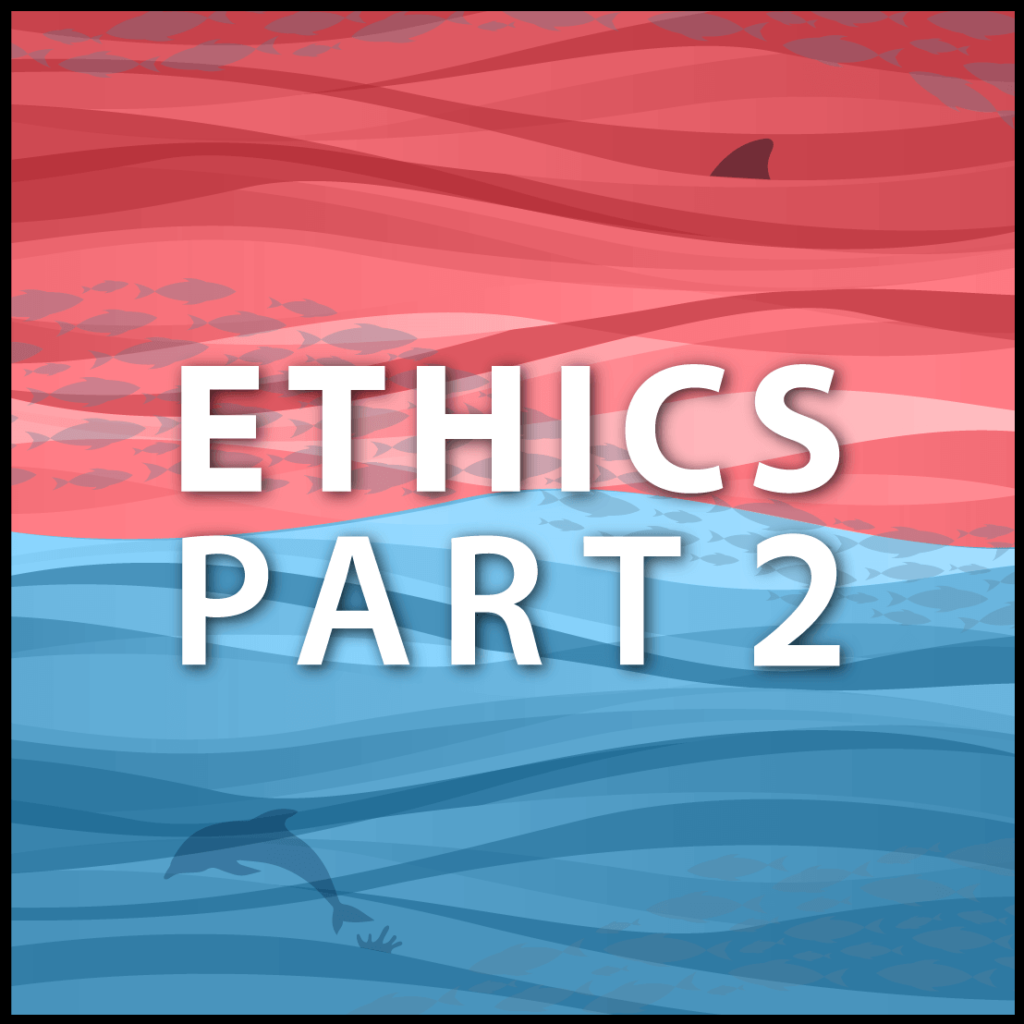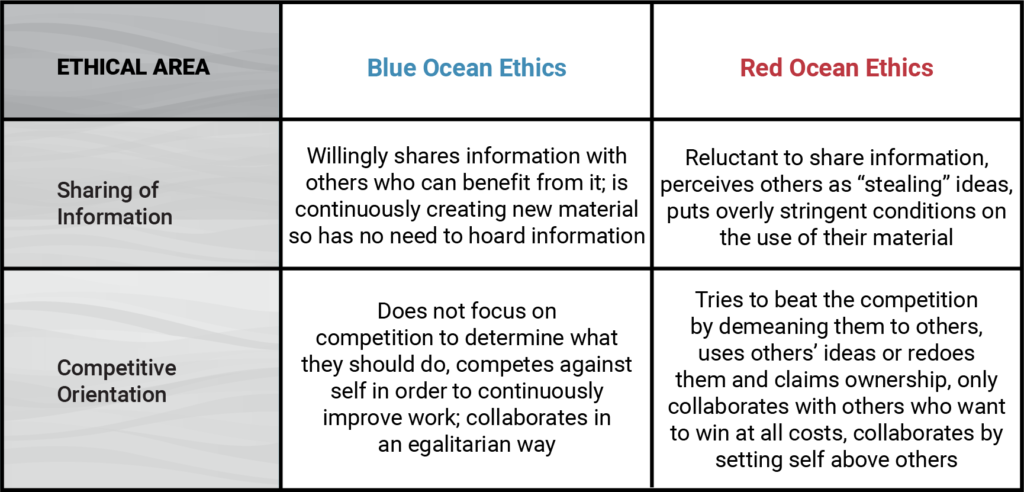
An Enneagram in Business (EIBN) requirement is that all network members adhere to Blue Ocean ethics in order to maintain integrity and build trust among one another and with clients. These ethical guidelines, which I created, include the accurate representation of background and services; respect for intellectual property; open information and idea sharing; fair pricing; honoring agreements; an abundance rather than scarcity orientation; and respect for clients, collaborators and competitors.
Red Ocean Ethics: Individuals who use Red Ocean guidelines beat the competition using existing rules of competition and trading off between diversification (differentiation) of products, services, and cost.
Blue Ocean Ethics: Individuals who use Blue Ocean guidelines leverage untapped market space, expand existing industry boundaries, and/or move outside existing industry boundaries.
The translation of Blue Ocean guidelines from organizational use to individual practice has 10 areas; this blog reviews two more of the 10, with later blogs covering the remaining six areas.

Sharing of Information
What to share, how much to share, and on what platform should it be shared? These are important questions, but first you need to have something you’ve created you want to share. Second, hopefully, others find what you have to share as having value. Third, do you really want to share and how widely?
In the Blue Ocean, many things are openly shared, but not everything. For example, items with a copyright on them, even if they are in books or websites or in other formats, are meant to be shared for information and education, but this doesn’t mean someone else can simply use the material in anyway they choose. However, there is still sharing as long as the copyright is respected.
In the Red Ocean, there is a reluctance to share just about everything, or a presumption that if someone uses something you have in any way created, it is stealing. Over the years, I have seen a familiar pattern, both in the world of consulting and the Enneagram community. The theme is so familiar to me that it is recognizable in an instant. Individuals who are the most concerned about other people “stealing” their work are the very individuals most likely to take the work of others and claim it as their own. It is a very “Red Ocean” way of functioning, projecting one’s own negative behavior onto others. For example, I see some people trademarking everything, which is a higher order of effort and expense than a copyright. And these same people do and have taken the work of others. It’s uncanny.
Why is there a reluctance to share?
Sometimes it is because creators are so proud of their own work, they simply don’t want others to take it. Or, these same individuals maybe concerned that one piece of outstanding work will be hard for them to replicate; it is their claim to fame and masterpiece. The result: they have difficulty letting go.
In the consulting arena, I knew a consultant who created a wonderful film that he sold at a fair price and became the “best-in-class” way to teach a specific topic. Once it became very popular, he raised his prices dramatically and made it a requirement that anyone purchasing the film spend 5-days training with him (more money!). What happened? People no longer purchased his film, and he no longer created anything that made a difference. He had shifted from Blue Ocean to Red Ocean and became retracted. It was sad to observe.
I am generally known as someone who is generous with sharing materials, but there are some people who would say I am not generous at all. Among them would be the man who insisted by email and phone that because he bought a $10 tape of my conference session sold by the IEA – he did not attend either the conference or my session – I should send him my power point slides. When I said “no” because the slides are proprietary and not for distribution, but that I would be happy to send him the training tool used in the session without charge, he was furious about “my unwillingness to share.” From my perspective, his “ask” was too big and his attitude too small. I, by the way, sometimes send a slide to someone I hardly know – for their use only – and it has a lot to do with what is asked, but just as importantly, how it is asked.
Competitive Orientation
I have sat in sessions with presenters or heard side-bar conversations in which Enneagram “teachers” – usually newer teachers, but not always – explain why their work is better than another Enneagram teacher’s. Sometimes they make an explicit comparison in terms of making derogatory remarks about someone else’s work and laudatory remarks about their own. Sometimes, they simply make negative remarks about someone else. When done in public programs or conference sessions, people notice and it is interpreted as exactly what it is: nasty and competitive. When the remarks are made in a more informal setting, word of it still gets out and creates a negative undertone and non-collaborative culture.
At a recent Enneagram conference, several people who were there for the first time asked me this: Why do so many Enneagram teachers “elbow each other with sharp elbows.” They mentioned that I don’t and a few other teacher who also do not, but wondered why the need to compete. What for?
When I run professional programs, conference sessions, I don’t have many rules, but here is one I do have. I establish a norm that it is not OK to make negative comments about other Enneagram teachers. Positive comments are fine, but I’lI intercept a negative comment immediately to establish this ground rule.
Why do it?
There are many reasons for this: inexperience, Red Ocean rules of competition, insecurity, and more. When I have seen or heard other Enneagram professionals put the work of others down in order to boost themselves up, I comment on this directly to them. They, of course, don’t like to hear this from me, and their answer is invariably the same: “But my work is better than….” And my answer is the same: “Perhaps and perhaps not, but your work should stand on its own and if it does not, you might want to think about why you need to put someone else’s work down and/or use it as a way to boost your work up.”
Blue Ocean Summary
Sharing of concepts and practices furthers the work of all of us in the Enneagram world. So does respect for the work of others. My brother, a wise and funny type 6, always says that people compete the most when the rewards are limited. In the Red Ocean, perhaps the rewards seem limited: fame, money, power, territory. In the Blue Ocean, the rewards are unlimited as are the possibilities.
Ginger Lapid-Bogda PhD, the author of seven Enneagram-business books, is a speaker, consultant, trainer, and coach. She provides certification programs and training tools for business professionals around the world who want to bring the Enneagram into organizations with high-impact business applications, and is past-president of the International Enneagram Association. Visit: TheEnneagramInBusiness.com | ginger@theenneagraminbusiness.com

Hi Ginger, thank you for putting so eloquently the great insights of what is happening on the ground. Sadly, in today’s market of fast growth, fast training, fast curriculum writing, many will turn to using other’s work as their own. Thus, people feel a need to hold onto to their precious developments. I thank you for sharing your works generously, as it inspires me to continue to credit to creators if I should need to use (with permission) any part of works allowed, as respect for our fellow trainers. This way we all win and The Ocean remains Eco friendly.… Read more »